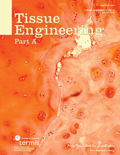
Tissue Engineering Part A
Scope & Guideline
Advancing Tissue Engineering for Tomorrow's Healthcare
Introduction
Aims and Scopes
- Biomaterials Development and Characterization:
Research focused on the design, synthesis, and evaluation of novel biomaterials such as hydrogels, scaffolds, and composites for various tissue engineering applications. - Cell and Tissue Engineering:
Studies involving the differentiation and application of stem cells, including mesenchymal stem cells and induced pluripotent stem cells, for tissue regeneration and repair. - 3D Bioprinting and Biofabrication:
Innovative approaches to bioprinting techniques, including the use of bioinks, to create complex tissue structures and organoids for research and therapeutic applications. - In Vitro and In Vivo Models:
Development of sophisticated in vitro and in vivo models to study cellular behavior, tissue interactions, and the effectiveness of engineered constructs in regenerative medicine. - Mechanobiology and Biophysical Cues:
Investigating the effects of mechanical forces and environmental factors on cell behavior, tissue development, and regeneration. - Immunology and Regenerative Medicine:
Research exploring the immunomodulatory properties of biomaterials and therapies that enhance tissue regeneration while minimizing adverse immune responses.
Trending and Emerging
- Advanced 3D Bioprinting Techniques:
There is a significant increase in publications focusing on novel bioprinting techniques and bioinks, highlighting the importance of creating complex, functional tissue structures. - Nanotechnology in Tissue Engineering:
The integration of nanomaterials and nanoengineering approaches is gaining traction, with studies exploring their role in enhancing the properties of scaffolds and promoting cellular interactions. - Extracellular Vesicles and Secretomes:
Research on the therapeutic potential of extracellular vesicles and stem cell-derived secretomes is emerging as a promising area, focusing on their roles in tissue repair and regeneration. - Personalized Medicine and Patient-Specific Models:
The development of personalized tissue models and therapies tailored to individual patient needs is becoming increasingly prominent, reflecting a shift towards precision medicine. - Mechanobiology and its Applications:
Studies examining the influence of mechanical stimuli on cellular behavior and tissue development are on the rise, emphasizing the importance of biophysical cues in tissue engineering.
Declining or Waning
- Traditional 2D Cell Culture Models:
There is a noticeable decline in studies solely based on traditional 2D cell cultures as researchers increasingly adopt 3D models that better mimic the in vivo environment. - Static Culture Systems:
Static culture systems are being replaced by dynamic and perfused systems that provide more physiologically relevant conditions for tissue engineering. - Single-Cell Analysis Without Integration:
The focus on single-cell analysis without integrating multi-omic approaches is waning, as comprehensive profiling techniques become more desirable for understanding complex biological systems.
Similar Journals
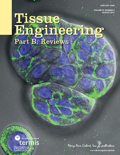
Tissue Engineering Part B-Reviews
Transforming Insights into Impactful Tissue Engineering.Tissue Engineering Part B-Reviews is a premier academic journal published by MARY ANN LIEBERT, INC, focusing on the interdisciplinary field of tissue engineering and regenerative medicine. With an impressive impact factor that places it in the Q1 category across multiple relevant fields—including Biochemistry, Bioengineering, Biomaterials, and Biomedical Engineering—this journal provides a vital platform for researchers and professionals to disseminate cutting-edge findings and comprehensive reviews. Covering a vast scope from 2008 to 2024, the journal is committed to advancing knowledge in the application of engineering principles to biological tissues, making it an indispensable resource for those at the forefront of biomedical innovation. While the journal does not currently offer open access options, its rigorous peer review process ensures high-quality contributions that are essential for academic and practical advancements. The journal's rankings in Scopus reflect its significance, catering to a diverse audience of students, researchers, and practitioners seeking the latest insights in this dynamic field.

Stem Cell Research & Therapy
Exploring Breakthroughs in Stem Cell BiologyStem Cell Research & Therapy is an esteemed international journal published by BMC, specializing in the rapidly advancing fields of stem cell research and regenerative therapies. Since its inception in 2010, the journal has embraced an Open Access model, ensuring that vital research is readily accessible to a global audience. With a significant impact in the scientific community, it holds Q1 quartile rankings in prestigious categories such as Biochemistry, Genetics and Molecular Biology, Cell Biology, and Molecular Medicine, highlighting its critical role in promoting groundbreaking research. The journal’s high Scopus rankings—placing it in the top echelons of its fields—reflect its commitment to publishing high-quality, peer-reviewed studies that advance our understanding of stem cell biology and therapeutic applications. Aimed at researchers, healthcare professionals, and students alike, Stem Cell Research & Therapy is an indispensable resource for those dedicated to the exploration and innovation within this transformative area of science.

Stem Cells International
Advancing the Frontiers of Stem Cell ResearchStem Cells International is a premier open access journal published by HINDAWI LTD, focusing on the rapidly evolving field of stem cell research. With an ISSN of 1687-966X and E-ISSN 1687-9678, this journal has been a vital resource since its inception in 2010, showcasing innovative studies and breakthroughs up to 2024. Positioned in Q3 in Cell Biology and Q2 in Molecular Biology for 2023, as well as well-ranked in the Scopus database, the journal serves as an essential platform for researchers, professionals, and students dedicated to exploring the implications of stem cell technology in regenerative medicine and biological research. The open access model ensures wide accessibility, fostering collaboration and knowledge-sharing across the scientific community, making it a cornerstone in advancing the understanding and application of stem cell science.
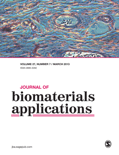
JOURNAL OF BIOMATERIALS APPLICATIONS
Advancing the frontier of biomaterials research.JOURNAL OF BIOMATERIALS APPLICATIONS, published by SAGE PUBLICATIONS LTD, serves as a pivotal platform for the dissemination of cutting-edge research in the field of biomaterials and biomedical engineering. With an ISSN of 0885-3282 and an E-ISSN of 1530-8022, this journal has been a respected venue for scholarly communication since its inception in 1986. Aiming to provide comprehensive insights into the applications of biomaterials, this journal publishes high-quality articles that explore innovative materials and methodologies, thereby fostering advancements in medical technology and tissue engineering. The journal consistently ranks in the third quartile (Q3) for both Biomaterials and Biomedical Engineering categories, strengthening its position among the noteworthy academic resources available today. With a dedicated readership comprising researchers, industry professionals, and students, JOURNAL OF BIOMATERIALS APPLICATIONS plays a vital role in supporting knowledge exchange and scientific progress within these dynamic fields.

Current Stem Cell Research & Therapy
Cultivating Knowledge in Stem Cell ApplicationsCurrent Stem Cell Research & Therapy, published by Bentham Science Publishers Ltd, is a leading journal dedicated to advancing the field of stem cell research. With an ISSN of 1574-888X and an E-ISSN of 2212-3946, this journal has been a valuable resource since its inception in 2006 and continues to broaden its scope through 2024. Recognized in the Q2 quartile for Medicine (miscellaneous) and ranked in the 66th percentile among its peers, the journal plays a crucial role in disseminating high-quality, peer-reviewed research that explores both the therapeutic and biological implications of stem cells. Located in the United Arab Emirates, Current Stem Cell Research & Therapy embraces a global audience of researchers, professionals, and students, providing a vibrant platform for discourse and innovation. While the journal offers subscription-based access, it remains committed to enhancing the scientific community's understanding of stem cell therapy and its applications across various medical fields.
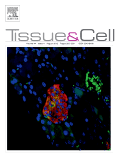
TISSUE & CELL
Bridging Basic Research and Clinical ApplicationsTISSUE & CELL is a prominent academic journal, published by CHURCHILL LIVINGSTONE, that has been at the forefront of research in the fields of cell biology, developmental biology, and miscellaneous areas of medicine since its inception in 1969. With a strong focus on high-quality research, TISSUE & CELL has established itself within the academic community, holding a Q3 ranking in both Cell Biology and Developmental Biology, and a Q2 ranking in Medicine as of 2023. The journal aims to disseminate significant findings that contribute to the understanding of tissue structure and function, helping to bridge the gap between basic biological research and clinical applications. While it operates on a subscription basis and does not currently offer Open Access options, the journal remains a vital resource for researchers, professionals, and students interested in cutting-edge developments in the biological sciences. The journal's address is located in the scenic city of Edinburgh, further establishing its academic heritage in the United Kingdom.

Inflammation and Regeneration
Leading the charge in open-access immunology and regenerative research.Inflammation and Regeneration is a prominent open-access journal published by BMC, focused on the discerning fields of immunology, cell biology, and regenerative medicine. Since its establishment in 2016, the journal has provided a platform for the dissemination of high-quality research, contributing significantly to the advancement of knowledge in inflammation processes and regenerative therapies. With a remarkable impact reflected in its Q1 quartile rankings in Cell Biology and Immunology for 2023, Inflammation and Regeneration stands out as a leading resource for researchers and practitioners. The journal's commitment to open access ensures that critical findings are readily available to a global audience, fostering collaboration and innovation in the scientific community. With a Scopus ranking that places it in the top 20% of its categories, Inflammation and Regeneration serves as an essential reference for those seeking to stay at the forefront of immunological research and its applications.

BIOCELL
Elevating Scientific Dialogue in Cell BiologyBIOCELL is a distinguished peer-reviewed journal dedicated to the field of Cell Biology, published by TECH SCIENCE PRESS. Since its inception in 1995, the journal has been at the forefront of disseminating innovative research, with converged publication years extending from 1995 to 2013 and from 2015 to 2024. Although it currently holds a Q4 ranking in the Cell Biology category according to the 2023 category quartiles, BIOCELL aims to foster advancements by providing a platform for researchers, professionals, and students to share their findings in biochemistry, genetics, and molecular biology. The journal is available in both print (ISSN: 0327-9545) and digital formats (E-ISSN: 1667-5746) and seeks to attract contributions that enhance scholarly dialogue and understandings of cellular mechanisms and innovations. With a commitment to quality research and critical discourse, BIOCELL plays an important role in nurturing the scientific community within Argentina and beyond, offering vital insights that contribute to the advancement of the life sciences.

Journal of Orthopaedic Translation
Pioneering innovative solutions in orthopedic health.The Journal of Orthopaedic Translation is a leading peer-reviewed publication dedicated to advancing the field of orthopedics through innovative research and clinical implications. Published by Elsevier and available as an Open Access journal since 2013, it ensures that cutting-edge insights and findings are accessible to a global audience, promoting collaboration and knowledge sharing among researchers, professionals, and students. With an impressive impact factor, the journal has achieved a remarkable Q1 ranking in the categories of Orthopedics and Sports Medicine, placing it in the top 1% of journals in this highly specialized field. As of 2023, it ranks #5 out of 321 in conjunction with a notable 98th percentile achievement in Scopus Ranks, underscoring its reputation for excellence and relevance. Through a focus on both basic and applied research, the Journal of Orthopaedic Translation aims to bridge the gap between laboratory and clinical practice, contributing significantly to the evolving landscape of orthopedic health. Join us in exploring the transformative studies shaping the future of patient outcomes and surgical interventions.
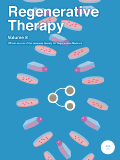
Regenerative Therapy
Transforming discoveries into impactful solutions in regenerative medicine.Regenerative Therapy is a premier open-access journal dedicated to advancing the fields of biomaterials, biomedical engineering, and developmental biology. Published by Elsevier in Japan, this journal has been an influential platform since its inception in 2015, contributing significantly to the global discourse on regenerative medicine. With an impressive Q2 ranking in major categories such as Biomaterials and Biomedical Engineering, it is recognized for its quality of research and innovation. Researchers seeking to disseminate their findings or explore cutting-edge developments will find Regenerative Therapy to be invaluable, reflecting current trends and fostering collaborations across interdisciplinary boundaries. The journal offers open access, ensuring that high-quality research is available to a broad audience and enhances the impact of scholarly work in the regenerative medicine community.